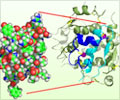Scientists have identified seven novel genetic regions associated with type 2 diabetes.

The majority of such 'genome-wide association studies' have been done in populations with European backgrounds. This research is notable for including DNA data from populations of Asian and Hispanic origin as well.
The researchers believe that, as more genetic data increasingly become available from populations of South Asian ancestry and, particularly, African descent, it will be possible to map genes implicated in type 2 diabetes ever more closely.
'One of the striking features of these data is how much of the genetic variation that influences diabetes is shared between major ethnic groups,' says Wellcome Trust Senior Investigator Professor Mark McCarthy from the University of Oxford. 'This has allowed us to combine data from more than 50 studies from across the globe to discover new genetic regions affecting risk of diabetes.'
He adds: 'The overlap in signals between populations of European, Asian and Hispanic origin argues that the risk regions we have found to date do not explain the clear differences in the patterns of diabetes between those groups.'
Among the regions identified by the international research team are two, near the genes ARL15 and RREB1, that also show strong links to elevated levels of insulin and glucose in the body – two key characteristics of type 2 diabetes. This finding provides insights into the ways basic biochemical processes are involved in the risk of type 2 diabetes, the scientists say.
Advertisement
'Although the genetic effects may be small, each signal tells us something new about the biology of the disease,' says first author Dr Anubha Mahajan of Oxford University. 'These findings may lead us to new ways of thinking about the disease, with the aim ultimately of developing novel therapies to treat and prevent diabetes. There's every reason to expect that drugs acting on these biological processes would have a far larger impact on an individual's diabetes than the genetic effects we have discovered.'
Advertisement
Source-Eurekalert















